Interview with German Cross in Gold winner and SS-Obersturmführer Fredrik Jensen of the heroic 5. SS-Panzer Division 'Wiking'.
Jensen was the most decorated Norwegian in German service and earned a plethora of various medals during his time as a volunteer. Malmo, Sweden, 1988.
Thanks for agreeing to meet me, it is a pleasure. As discussed, I would like to start by asking you why you chose to aid the Germans and join the Waffen-SS?
Frederik: Of course, as you understand Europe was different forty years ago. Nationalism was the watchword against communism. We were not for or against Hitler, he was the leader of Germany and I lived in Oslo. I did have an interest in what was going on in politics, and we knew Russia was in the hands of bad people. I met a few countrymen who lived in St. Petersburg and fled in 1919, they told of mass arrests and killings of anyone not supporting the Soviets under Lenin. My mind was made up that the Soviets were bad people who had to be watched. As I was growing up, I read more and more about the plight of the people under their control. Many would escape and find refuge in Norway, they all told the same stories, and Jews were leading the Soviets, and committing acts of defilement against the church and believers. There were some in the press who covered up these stories, saying they were not true, and denying Jews had anything to do with Bolshevism.
Many could see that there was a bias, and this created an undertone of resentment, as was happening all over Europe. Hitler brought this to the forefront and ripped the mask off those hidden behind it. I remember by 1939 most of Europe was in two camps, one was nationalist and anti-Soviet, the other pro-Soviet and against nationalists. I chose to be a nationalist and joined the party in Norway, I could see the path to truth, and it was the right thing to do. When Germany came into Norway it shook some of us, as it was not well understood why. Now we know Britain and her allies were planning on seizing our ports to deny trade with Germany, but Hitler was smart and beat them. After the Germans came, a new government was set up, and it was my party in charge now. Good changes came to the people and it was very popular, in spite of the daily propaganda the British broadcast via the exiled government. Except for small German bases, you would never know they were in Norway.
I had read up on the SS and it sounded like a very elite fighting army that harkened back to our common Germanic past. When Germany attacked Russia, the call went out for volunteers to join a new crusade, this time against Bolshevism. Friends and comrades flocked to either go to work in Germany or serve in the military. The more hardcore nationalists, like me, went to volunteer for the SS. Getting in was a challenge however, you had to be fit and able, no weaklings were allowed. Himmler knew we were Germanic, more so than the Germans in most cases. I passed my exams and was admitted as a probationary volunteer. From there we were given a date to report for training, which would take us to Germany. We were all filled with excitement of this new adventure that was awaiting us. Little did we fools know what that adventure meant; it would be life changing.
Can I ask how training was for you, did the Germans treat you as equals?
Frederik: Yes, training was good and the Germans were very kind to us, we could tell they were happy to have us. Our basic training was much like any other army, we got up early, exercised, ate, had inspection, went to classes or drills, ate, more drills, then cleaning, and to bed. There was enough free time to write letters or dream about the girls back home. We had a mix of instructors, some were German, and others were Danes, Dutch, or Norwegians. We mainly had to learn German, but we also spoke in our tongue as well. Training in the SS was like being in a very strict school, there was not a lot of screaming and yelling, some yes, on hard days, but mostly they were like teachers correcting a math problem. You will be surprised to know we had services every Sunday; some comrades were not religious so they could spend the day relaxing. Yes, the SS allowed time for Christ and most of my class went. I still remember the pastor wore the civilian badge of an SS member. After a while in training, we were allowed to go tour the area and the people were very kind to us, we wore the flag of Norway. One man who was a ship builder, who worked in Norway, insisted on buying us lunch one day. He told us in almost perfect Norwegian how proud he was that Europe was standing up with Germany to fight Jewish Bolshevism. I still remember that, if only we had won, Europe would not be divided like today and Germany would be whole.
[Above: 'Wiking' somewhere in Russia.]
You fought on the Eastern Front with 'Das Reich', can I ask what it was like for you?
Frederik: No, get your facts right my boy, 'Das Reich' did not exist in June 1941; it was called 'SS-Reich'. I was assigned to the 'Der Führer' regiment of 'Reich', and then I went to 'Germania' in 'Wiking'. I remember first-off the vastness of Russia, it was endless forests, ponds, and rivers, wildlife everywhere; it was a hunter's paradise. Many units took advantage of this and lived off the land. Some nights our cooks made great meals of what was caught that day. We welcomed the goulash cannon [a large pressure cooker designed for fast cooking] when we had these types of feasts, we even had extra to share with locals. I saw the vast amount of prisoners and equipment that were captured; it was said Stalin was planning on attacking Germany, and this was proof. There was column upon column of tanks, trucks, tractors, and trains that fell into our hands. Of course, today it is said this is false and Stalin only wanted peace, that it was Hitler who stabbed him in the back. I saw the vast amount of material, something was going to happen. Maps were found on officers showing the German road system, bases, and supply depots. We were on the central sector of the front, and Moscow was our target. My unit got so close I actually saw the city, it was exciting for me. By the time we made it that far, we were attacked by the hordes of the east, which forced us back many kilometers. This attack caught us off guard and we were exhausted, so it was easy for the Soviets to push us back. I received a wound here that maybe saved my life.
It took a superhuman effort to halt them and stabilize the front by January 1942. The Soviet soldier was brave and determined when he had victory, but when we attacked back, they broke and surrendered. I noticed this about them often, they would fight hard until the line broke then they gave up. I should say something about the people as I have read the false accounts of how we treated them. We simply left them alone; they were not a threat to us and often welcomed us. I saw with my own eyes how they welcomed us as liberators in every city and town we went into. I still see the waving people, smiling because we brought their freedom back. We would become somewhat frustrated by this at times as it held us up. The people would line the streets and offer water and bread mainly, they were very poor. We in turn would offer chocolate or other food stuff we had. The diehard Soviets fled, they forced people to go with them who then escaped and returned. These people were in the thousands, I saw them. The partisans were starting to form out of Jews who had fled the vengeance of the civilians who were killing them, I saw that too.
I said earlier that Jews were linked to Bolshevism, and indeed they were, by 1920 most of the Politburo [the principal policymaking committee of the communist party in the Soviet Union] were Jews, and many normal Jews aided in turning in those who opposed the Soviets. By accounts of some townspeople, half of whole towns went missing. Jews opened synagogues while closing churches and the people were oppressed by them. They said it was punishment for the Tsar's treatment of the Jews. This is what 'Reich' came into in some towns, the Jews were run off, and in some cases, they were killed by the people. I have been told that some German units arrived and stopped the killings. Imagine this, yet today they say all we wanted to do was kill them. In the early months of the war, it was very easy as the great Red Army was broken and in full retreat, only the Devil saved them. The Soviets would launch massed attacks on us, and because our lines were very thin, they would break through easily and require a fire brigade to stop them. I had to deal with this often; during one of these attacks I had to push back an entire assault platoon. I ran out of ammunition and had to use a shovel and bayonet. This single act broke the momentum of a larger attack and my comrades said I saved our lines; I remember only being a fanatical lunatic determined to beat them back. This action brought me the nomination for the German Cross.
Did you see any war crimes while serving in the Waffen-SS?
Frederik: Well, that depends on what is the true definition of a war crime. 'Reich' and 'Wiking' were frontline combat units who rarely fought partisans or behind the lines. I know that there was trouble with partisans in some areas, but this was mostly handled through local militia or opposing factions. I have heard they were very cruel when they caught these partisans. I have seen photos of these groups shooting or hanging those they caught. Our orders were to fight them when they appeared, and later in the war they did come out in organized formations and in somewhat of a uniform. This made them legal combatants who were protected under the convention. It was when they fought in civilian clothes that they were treated as common criminals and faced prison or execution. I read that several SS divisions were accused of multitudes of crimes and many were tried after the war. I do not put any faith in the victor's justice; I for one believe all the stories they tell are made up, or loosely based on a small fact. I have known many SS men from many divisions and not once have I heard about a purposeful killing or torment. The Jews can be a separate issue, I know bad things happened to some of them, and they were put in camps for safekeeping, but the Waffen-SS did not do any of this. They want us to feel ashamed of our service for things we never did and would never do. I can attest that my comrades and I are blameless in these so-called crimes; they accuse us based on political vendettas and hate. They allowed the supposed eyewitnesses to present many stories that have been put in books all over Europe.
A paper recently reported SS men took babies and used them for skeet shooting -- how absurd! Yet there will be some idiot who will believe this. Another claims Panzers ran over an orphanage killing babies in cribs and then shooting the crying mothers. These go on and on and let us not mention the absurd [concentration] camp stories. As I have said, we treated the civilians with indifference at worst, and with kindness and friendship at best. Some of my men made girlfriends in Russia and helped Russian farmers when it was practical. We had no hate in our hearts, except for the Bolshevist system that killed millions of people, who simply disagreed with them. Those are the real crimes that are hidden and covered up.
[Above: Frederik Jensen, through the years. An unrepentant hero 'till the end. Click to enlarge!]
What do you remember about the end of the war?
Frederik: It was pure chaos; you could never imagine the total collapse of a nation like what Germany went through. Even though some towns still functioned, and some were unscarred, the people bore the burden. Every town had refugees, all railways were cut in many places, electricity would go out often and food was hard to come by, but not impossible. One thing I will say about Hitler is he made the people very self-sufficient, they survived when all was gone. I was wounded once and a family came out to dress me, they had medical supplies and the girl learned the skills in a youth group. The government seemed to do a good job of keeping people fed and organized until around April 1945. I was wounded and was taken prisoner, but was able to flee. The Americans got me and since I was in the SS I was arrested and sent to Dachau. They were pretty rough with us, as they had all been fed stories about how evil we had been. Medals were ripped off tunics, family photos taken or torn up, and formerly brave soldiers were broken down like children. They forced us to watch the movies they made showing the camps. We heard rumors that SS men had been murdered at Dachau in cold blood; we wondered if we might be next, they allowed ex-inmates to guard us.
It was very confusing as we knew not our fate. I was told that since I was a foreign volunteer, I would be returned to Norway to be shot. There were bright spots, some GIs were very friendly and gave out cigarettes and illegal items. I was surprised to see this, but it did not happen often. There was help for us; there was an underground network that was very vast that got messages of hope to us, and I was told I would be given help for a trial and no firing squad. That eased my nerves; some comrades were even broken out to go to other countries. Some of the escapes were quite ingenious. The Americans kept me for a couple of years, and then returned me to my home, where I was promptly re-arrested and put on trial. It was a complete farce, as everything we did, we did in the name of Norway, under a legal government who asked for our oath. These were only show trials designed to show the victors they were willing to cooperate to appease them. Many people secretly opposed them and sent words of support and encouragement.
Do you have any regrets for serving in the Waffen-SS?
Frederik: No, I do not and never will. I followed my conscience and know I did the right thing. The world was at a crossroads, and Hitler was trying to show everyone how dangerous the world enemy is, and under him Europe was truly free for the first time in generations. Now you might not like me saying that, but it is true. Even with wartime restrictions and censorship, there was still freedom. I have friends who went to the Riviera on vacation in 1942. Today some ask how I could serve such evil, knowing what happened to the Jews, but we are powerless to tell the truth. We have to be silent on many things for fear of retribution. I can tell you there is nothing to be ashamed about, there are many lies told about the Waffen-SS and since our main enemy now has power again over the media they get to tell our history as they saw it. All we can do is silently pray somehow the truth will find a way to come out, so that our many dead will be called heroes again, instead of villains. We were combat soldiers who were called to defend Europe against a poison that ended up winning and now look at what we have. We have done nothing for which we should be ashamed, we stood up to the evil and faced its wrath. Like the Northmen of old we stood and fought against a common enemy.
[Above: 'Wiking' soldiers during 'Operation Blue' in Russia, 1942.]
Fredrik Jensen German Cross in Gold recommendation:
'Based on a recommendation dated 29.09.1944 and signed by Btl. Fhr. Franz Pleiner; Endorsed 05.10.1944 by Rgt. Fhr. i.V. Herbert Oeck and 10.10.1944 by Div. Fhr. Karl Ullrich; Approved 02.11.1944 by Korps Kom. Gen. Herbert Otto Gille:
On 21.7.1943, the enemy continuously attacked the positions of the Narva battalion and the 7th company near Andreevka. Due to heavy losses suffered by the 7th company, the enemy in the afternoon managed to make a wedge, using tanks with a landing on the armor. Jensen commanded the 2nd Platoon, which held positions on the right flank of the 7th Company. Having made a wedge, the enemy infantry jumped from the tanks, while the enemy infantry followed it on the wedge. Jensen, lying in a trench on the left flank of his platoon, summoned four soldiers who lay closest to him, led them to a counterattack, despite the fact that the enemy, in the amount of about 30 people, had already settled in his trench and in bunkers located about 60 meters behind the trench. First, Jensen and four of his fighters with hand grenades, and when the grenades ended, magnetic mines of cumulative action and illumination missiles from signal pistols destroyed enemy soldiers who had settled in bunkers. Then, despite the strong fire of the defenders, he attacked the enemy in the area of the wedge and in the course of hand-to-hand combat gradually seized the enemy trench with a blow to the flank. When part of the enemy's wedged infantry began to withdraw, Jensen, although only two fighters remained under his command, since the other two were already wounded by that time, pursued her to the most enemy wire fences. Thanks to his personal bold and decisive actions, Jensen did not allow the indentation site to expand, closed the indentation gap and prevented the threat of a breakthrough.
26.7.1944, the battalion received an order together with the army units adjoining on the left flank, to clear the forest northeast of Byala-Podlaska from the enemy and open the Brest-Litovsk-Byala Podlaska highway. The 7th Company advanced on the left flank of the battalion. In front of the highway, the enemy counterattacked and repelled the units of the Wehrmacht adjoining the left flank, partially entering the rear of the 7th company. Jensen, realizing the threat and cautiously commanding the company, managed, with small losses, to take his company back, reshape it and meet the wedged enemy. To close the breach, Jensen decided to counterattack. The leader of the counterattack conducted at a fast pace, led by his fighters, Jensen managed to repel the enemy in close combat and restore communication with his neighbors. This prevented the failure of our offensive and the threat of an enemy offensive from the left flank along our position.
3.8.1944, the 7th Company was ordered to fill the gap between the 6th Company and the platoon of the SS division "Death's Head" southeast of Mikhalev. Jensen, with a platoon commander and a liaison, went ahead to conduct reconnaissance of the area. When Jensen reached the middle of the section, which was to be defended by his company, he was convinced that the platoon of the "Death's Head" Division was repelled by the enemy, who cut the Stanislavov-Okunev highway. Taking under his command an armored personnel carrier located in the neighboring section of the Wehrmacht anti-tank company, Jensen hit the enemy in the rear. By his sudden appearance in the rear of the enemy, he confused the enemy infantry. Jensen destroyed the running enemy with the fire of an onboard machine gun, and when the machine gun jammed, with the fire of three submachine guns and hand grenades. Separate groups of enemy soldiers continued to resist in their trenches, and Jensen could not effectively fire at them from an armored personnel carrier. Having quickly made a decision, he, together with two fighters, left the armored personnel carrier and destroyed the enemy group in close combat. After that, he resumed the pursuit of the fleeing enemy in an armored personnel carrier, until he reached the river, which he could not overcome in an armored personnel carrier. During the battle, Jensen took 24 prisoners and captured four heavy machine guns, six light machine guns, two anti-tank guns, 14 submachine guns and several rifles. The enemy lost about 40 men killed. After the battle, Jensen sent the armored personnel carrier back, took command of the platoon and returned it to its previous position.
21/8/1944, the enemy repeatedly attacked the positions of the 5th company, which was part of the Jensen battle group, in the Podbozhe area. During the fifth attack, the enemy, due to the failure of one of the machine guns, managed to make a wedge. To close the wedge gap, the platoon holding the section retreated about 150 meters from its previous position. Jensen immediately personally hurried to the site of the wedge, took the platoon under his command and in close combat threw off the wedged enemy. When shortly after securing the previous position, the calculation of one of the machine guns, falling under enemy mortar fire, was destroyed by fragments of a mine, and the enemy approached the platoon position by 50 meters, Jensen himself laid down machine gun fire and repelled the attack. The enemy then stopped the attack.'
[Above: Fredrik Jensen displays his medals at his home in Estepona, Spain.]
[Above: Fredrik Jensen at 89 years old, shortly before his death.]
Found at http://www.mourningtheancient.com/index1.htm




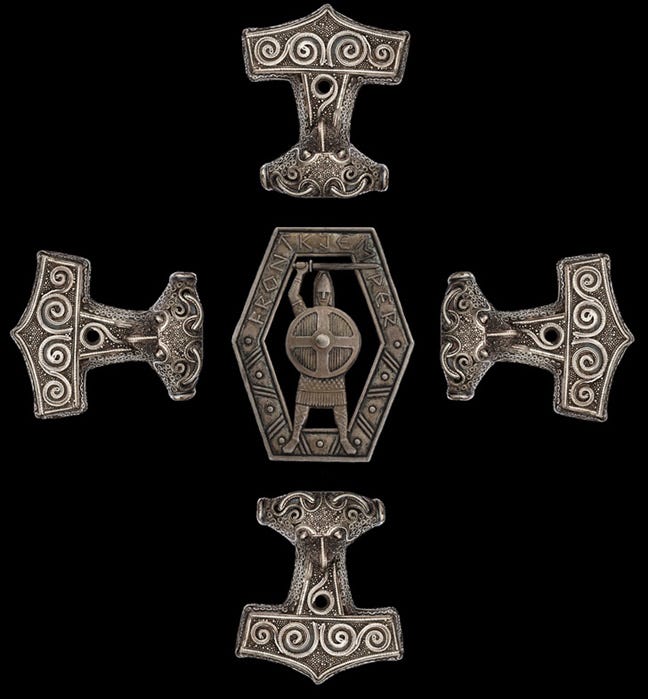
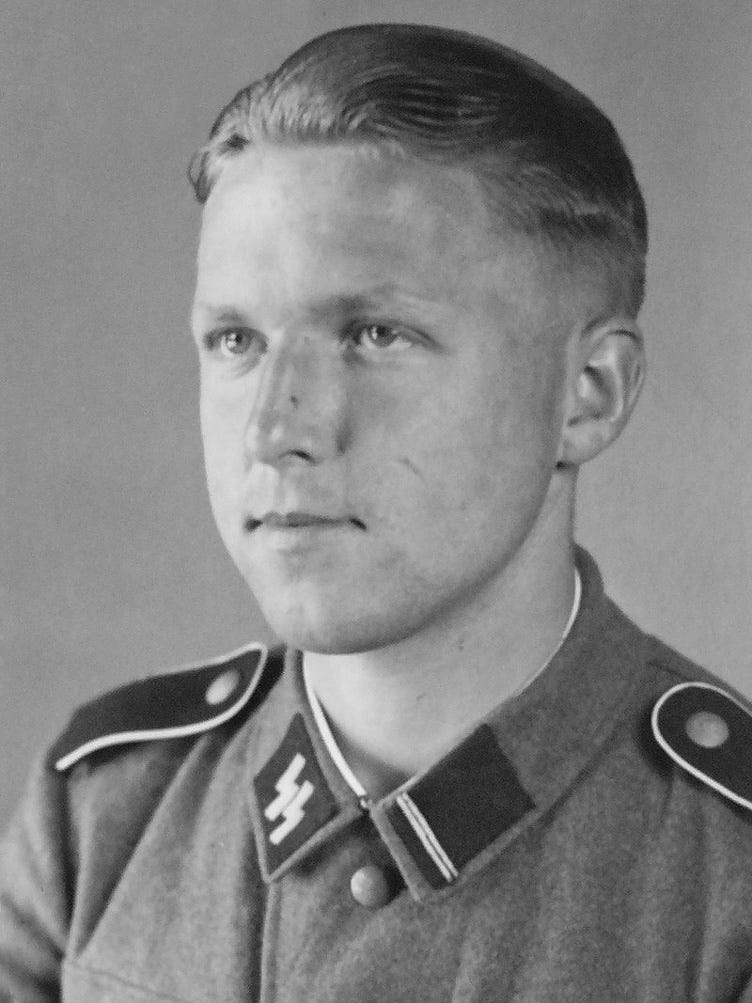
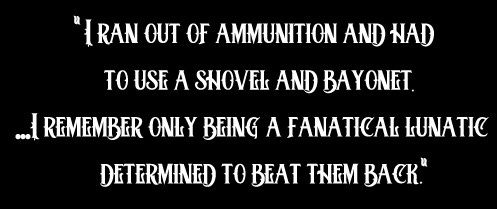
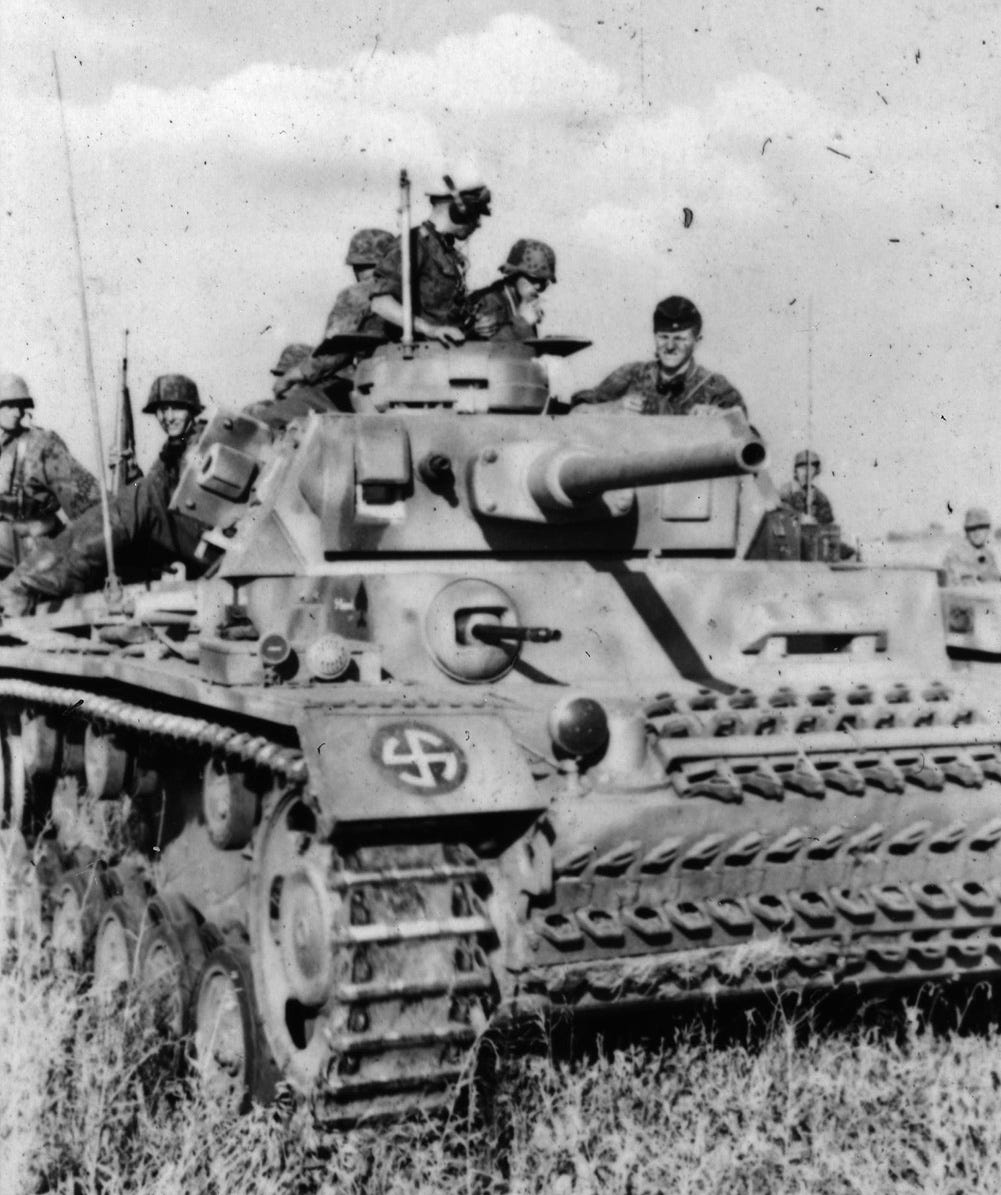
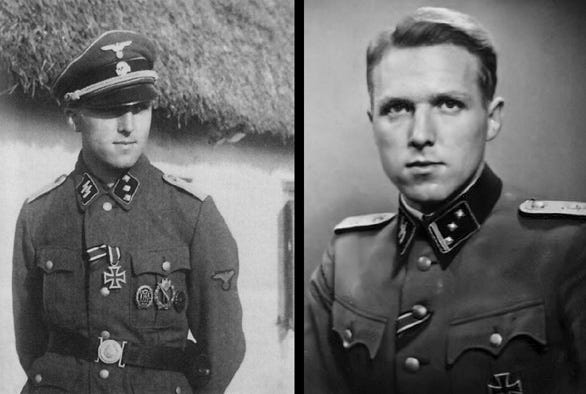
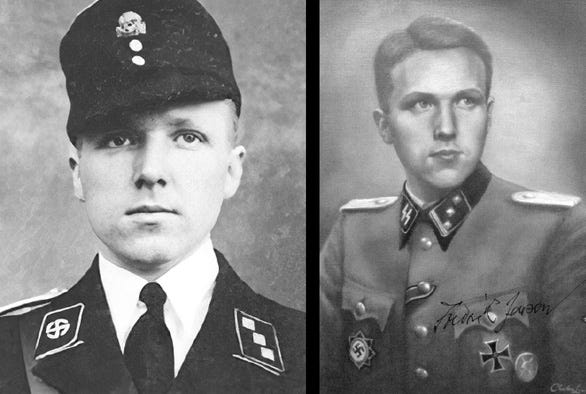
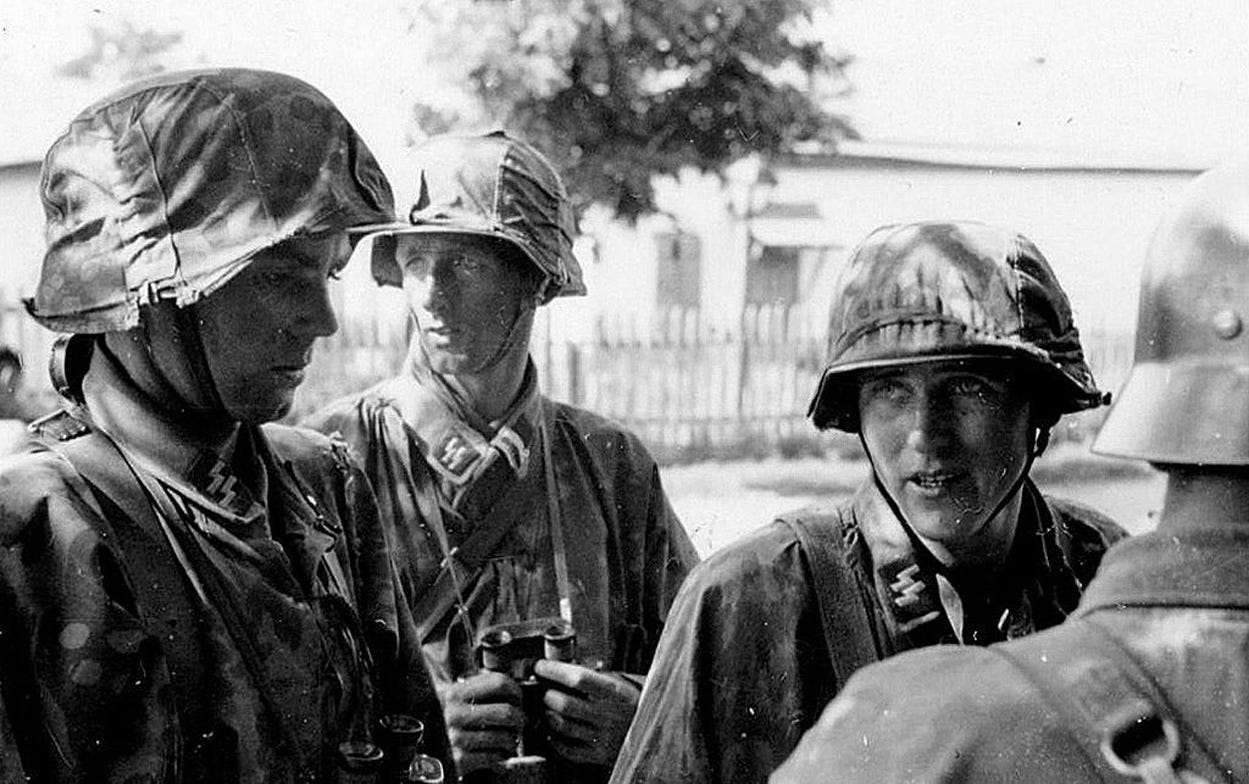
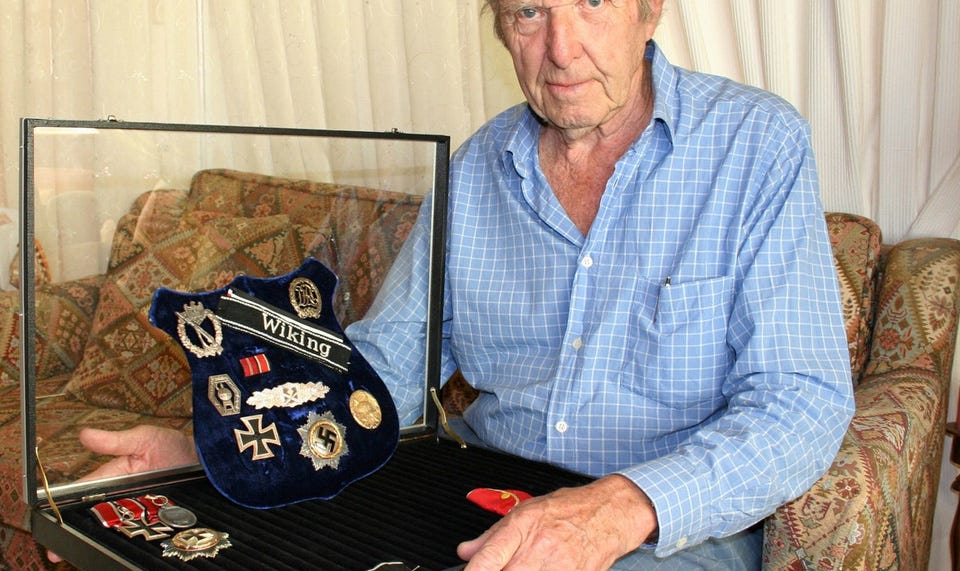
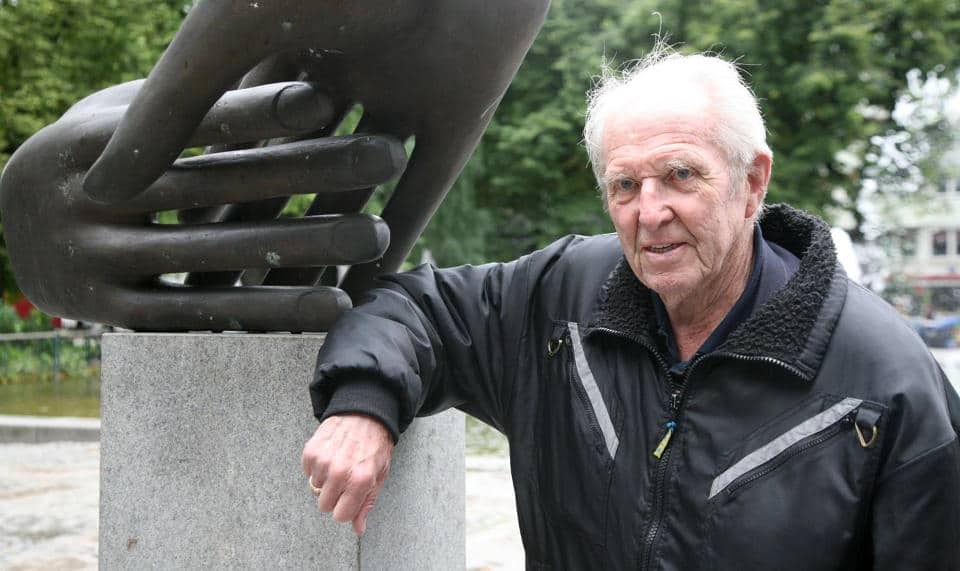

An incredibly brave, principled man. His observations regarding the Jews and their deep involvement in the Bolshevik "movement" is extremely damning. The world is waking up to the mass hoodwinking, despite the frenetic efforts of Judaic supremacist enabling censorship